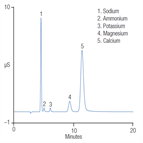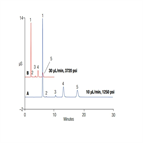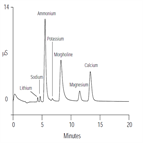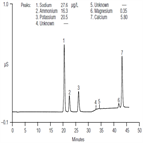Find methods for your needs
Refine by Feature
Displaying 1-5 of 23 results for Tag: Ammonium
AB133: Cost-Effective Determination of Inorganic Anions and Cations in Municipal Drinking Water Using Capillary Ion Chromatography (Cations)
Instrument Type: ICThis study describes the determination of inorganic anions and cations in drinking water using the Thermo Scientific Dionex ICS-5000 capillary IC system. Here shows the determination of inorganic cations in drinking water using Dionex IonPac CS12A capillary column.
TN121: Fast Determinations of Inorganic Cations in Municipal Wastewater Using High-Pressure Capillary IC
Instrument Type: ICInorganic cations were determined in municipal wastewater samples using a high pressure capillary IC system. All six cations were separated on IonPac CS16 capillary column at 30 mM MSA and 40 C. The high pressure capabilities of the ICS-5000+ capillary IC system were demonstrated by using flow rates at 3x of the typical capillary flow rate, 30 uL/min. The separation at the standard flow rate of 10 uL/min is also shown. An ICS-6000 can be used for this application.
AN86: Determination of Trace Cations in Power Plant Waters Containing Morpholine (Method 2)
Instrument Type: ICMorpholine and ammonium are used as additives in power plant waters. Morpholine acts as a corrosion inhibitor, whereas ammonium is used to control pH. In this matrix, it is critical to determine the presence of inorganic cation contaminants. This method uses the IonPac CS14 column to quantify trace concentrations of lithium, sodium, potassium, magnesium, and calcium in the presence of high levels of ammonium and morpholine. Acetonitrile can be added to the eluent to improve peak shape and optimize resolution for some of the cations of interest.
AN86: Determination of Trace Cations in Power Plant Waters Containing Morpholine (Method 1)
Instrument Type: ICMorpholine and ammonium are used as additives in power plant waters. Morpholine acts as a corrosion inhibitor, whereas ammonium is used to control pH. In this matrix, it is critical to determine the presence of inorganic cation contaminants. This method uses the IonPac CS14 column to quantify trace concentrations of lithium, sodium, potassium, magnesium, and calcium in the presence of high levels of ammonium and morpholine. Acetonitrile can be added to the eluent to improve peak shape and optimize resolution for some of the cations of interest.
AU155: Determination of Cations and Amines in Hydrogen Peroxide by Ion Chromatography Using a RFIC (Reagent-Free) System
Instrument Type: ICHydrogen peroxide is an essential chemical in the fabrication of integrated circuit and microcircuit devices. Maximum allowable contaminate levels for semiconductor grade hydrogen peroxide can be as low as <100 ppt (ng/L) per individual inorganic cation. This application uses an IonPac CS17 column to determine trace cations and amines in hydrogen peroxide with a large-loop injection. The CS17 column separates amines without the organic solvent eluent modifier needed for separating amines when using older cation-exchange ion-chromatography (IC) columns.





